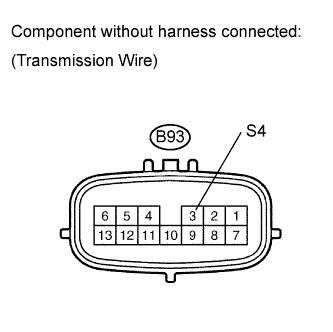Dtc P0982 Shift Solenoid D Control Circuit Low (Shift Solenoid Valve S4)
DESCRIPTION
MONITOR DESCRIPTION
MONITOR STRATEGY
TYPICAL ENABLING CONDITIONS
TYPICAL MALFUNCTION THRESHOLDS
COMPONENT OPERATING RANGE
WIRING DIAGRAM
INSPECTION PROCEDURE
INSPECT TRANSMISSION WIRE (S4)
CHECK HARNESS AND CONNECTOR (TRANSMISSION WIRE - ECM)
INSPECT SHIFT SOLENOID VALVE S4
DTC P0982 Shift Solenoid "D" Control Circuit Low (Shift Solenoid Valve S4) |
DTC P0983 Shift Solenoid "D" Control Circuit High (Shift Solenoid Valve S4) |
DESCRIPTION
Shifting from 1st to 5th is performed in combination with "ON" and "OFF" operation of the shift solenoid valves SL1, SL2, SL3, S4 and SR which are controlled by the ECM. If an open or short circuit occurs in either of the shift solenoid valves, the ECM controls the remaining normal shift solenoid valves to allow the vehicle to be operated smoothly (Fail safe function).DTC No.
| DTC Detection Condition
| Trouble Area
|
P0982
| ECM detects short in solenoid valve S4 circuit 2 times when solenoid valve S4 is operated (1-trip detection logic)
| - Short in shift solenoid valve S4 circuit
- Shift solenoid valve S4
- ECM
|
P0983
| ECM detects open in solenoid valve S4 circuit 2 times when solenoid valve S4 is not operated (1-trip detection logic)
| - Open in shift solenoid valve S4 circuit
- Shift solenoid valve S4
- ECM
|
MONITOR DESCRIPTION
The ECM commands gear shifts by turning the shift solenoid valves "ON/OFF". When there is an open or short circuit in any shift solenoid valve circuit, the ECM detects the problem and illuminates the MIL and stores the DTC. And the ECM performs the fail-safe function and turns the other normal shift solenoid valves "ON/OFF" (In case of an open or short circuit, the ECM stops sending current to the circuit.)(COROLLA_ZRE142 RM000000O8L0N2X.html).
MONITOR STRATEGY
Related DTCs
| P0982: Shift solenoid valve S4/Range check (Low resistance)
P0983: Shift solenoid valve S4/Range check (High resistance)
|
Required sensors/Components
| Shift solenoid valve S4
|
Frequency of operation
| Continuous
|
Duration
| 0.064 sec. or more
|
MIL operation
| Immediate
|
Sequence of operation
| None
|
TYPICAL ENABLING CONDITIONS
P0982: Range check (Low resistance):The monitor will run whenever this DTC is not present.
| None
|
Shift solenoid valve S4
| ON
|
Time after solenoid OFF to ON
| 0.008 seconds or more
|
Battery voltage
| 8 V or more
|
Ignition switch
| ON
|
Starter
| OFF
|
P0983: Range check (High resistance):The monitor will run whenever this DTC is not present.
| None
|
Shift solenoid valve S4
| OFF
|
Time after solenoid ON to OFF
| 0.008 seconds or more
|
Battery voltage
| 8 V or more
|
Ignition switch
| ON
|
Starter
| OFF
|
TYPICAL MALFUNCTION THRESHOLDS
P0982: Range check (Low resistance):Solenoid terminal voltage level
| Low
|
P0983: Range check (High resistance):Solenoid terminal voltage level
| High
|
COMPONENT OPERATING RANGE
Shift solenoid valve S4
| Resistance: 11 to 15 Ω at 20°C (68°F)
|
WIRING DIAGRAM
INSPECTION PROCEDURE
- NOTICE:
- Perform the universal trip to clear permanent DTCs (COROLLA_ZRE142 RM000000W770S6X.html).
| 1.INSPECT TRANSMISSION WIRE (S4) |
Disconnect the transmission wire connector from the transaxle.
Measure the resistance according to the value(s) in the table below.
- Standard resistance:
Tester Connection
| Condition
| Specified Condition
|
3 - Body ground
| 20°C (68°F)
| 11 to 15 Ω
|
| 2.CHECK HARNESS AND CONNECTOR (TRANSMISSION WIRE - ECM) |
Connect the transmission wire connector to the transaxle.
Disconnect the connector from the ECM.
Measure the resistance according to the value(s) in the table below.
- Standard resistance:
Tester Connection
| Condition
| Specified Condition
|
B31-78 (S4) - Body ground
| 20°C (68°F)
| 11 to 15 Ω
|
| | REPAIR OR REPLACE HARNESS OR CONNECTOR |
|
|
| 3.INSPECT SHIFT SOLENOID VALVE S4 |
Remove the shift solenoid valve S4.
Measure the resistance according to the value(s) in the table below.
- Standard resistance:
Tester Connection
| Condition
| Specified Condition
|
Solenoid Connector (S4) - Solenoid Body (S4)
| 20°C (68°F)
| 11 to 15 Ω
|
Connect the positive (+) lead to the terminal of the solenoid connector, and the negative (-) lead to the solenoid body.
- OK:
- The solenoid makes an operating sound.



